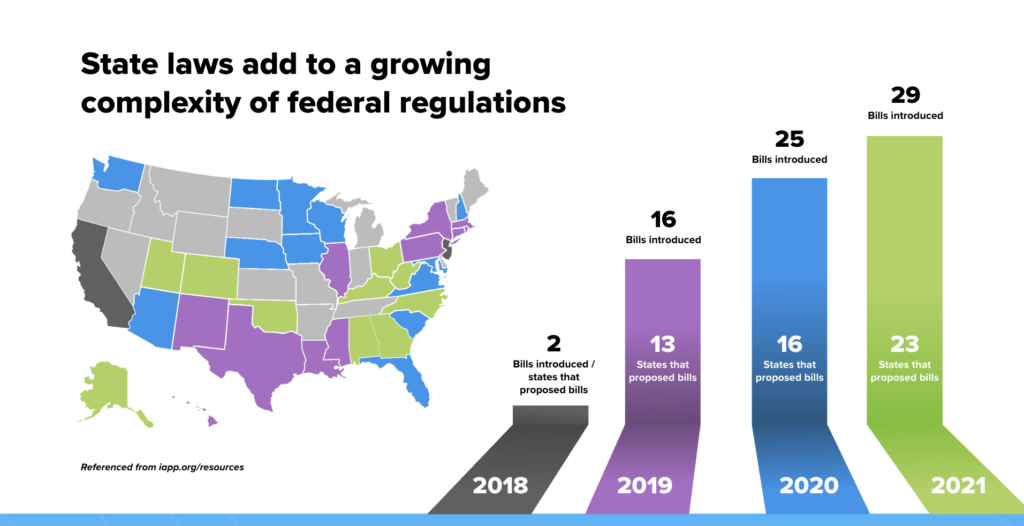Are you funding bad behavior? How to verify your lead vendors and create a better consumer experience

As consumers, we all experience daily unwanted phone calls and texts. As marketers, we must ask ourselves – are we part of the problem or part of the solution? This was the topic that Steve Rafferty, ActiveProspect’s CEO & Founder, and Jonathan Beamer, CMO of AmeriSave Mortgage Corporation, recently addressed when speaking at LeadsCon’s inaugural Consent Summit in Washington DC on October 25, 2022. The session, titled “Are You Funding the Marketing Assault on the American Consumer?” was structured as a fireside chat between Steve and Jonathan. Here is a summary of some of the key points covered during the session.
What is marketing assault?
The session started with a review of the current state of the American consumer. Is it fair to say that consumers are under assault with all the unsolicited outreach they are exposed to? Based on the stats that were shared, the answer is yes. Some of the industry stats shared included that US consumers were hit with 50 billion robocalls in 2021 and that there are 244 million active registrations on the federal Do Not Call list.
To better illustrate the state of mind of consumers, the speakers shared some popular internet memes about extended auto warranty campaigns. These memes really capture how consumers feel about the invasive nature of these calling campaigns. Steve asked the crowd how many of them had received one of these calls about extended auto warranties, and the entire room raised their hand.

However, all this unsolicited outreach can’t be attributed to marketers alone. Much of it is from scammers. Steve and Jonathan discussed that they were both recently targeted via text with the Pig Butchering scam. All of this outreach from nefarious actors is what has really eroded consumers’ trust. They are very wary about receiving calls from unknown parties. They are also angry and are demanding change.
This situation is challenging for marketers as well. According to Hiya, 79% of unidentified calls go unanswered. This is especially challenging for marketers in the mortgage industry, who rely on speaking to consumers on the phone. Furthermore, individual states are passing regulations aimed at solving the problem, but are creating a complex patchwork of rules and regulations for marketers to navigate.
The result is a tough situation for both consumers and marketers.

How did we get here?
Steve and Jonathan discussed some of the factors that have contributed to this situation over the years. One point that was discussed was the way marketers measure their campaigns. The generally accepted practice is to measure the immediate ROI. Given the low cost of mass outreach campaigns, it only takes a small percentage of conversions to justify the ROI of the campaign. Marketers generally fail to measure the negative effects of campaigns.
What is the cost of annoying the people that didn’t convert? These negative outcomes might materialize as complaints or bad reviews. They could also cause email and call deliverability issues. Often these costs don’t materialize until later as long-term damage to the brand. Despite these long-term consequences, it’s often hard for marketers to do the right thing because they are under enormous pressure to produce results.
You are one of the good guys, right?
You might be thinking this doesn’t apply to you because your company doesn’t engage in unsolicited marketing outreach. You might be one of those responsible companies that only engages in consent-based marketing, whereby you only contact consumers that have given their prior express written consent to be contacted. Even so, you could be funding bad behavior.
Often consent-based marketers rely on partners to generate leads on their behalf. These media buys are often structured on a cost-per-lead basis, so your partners have financial incentive to generate as many leads for you as possible. It is up to you – as the lead buyer- to verify the quality remains high and your lead vendors don’t cut any corners in order to generate leads using questionable tactics.
When working with partners, trust but verify
It is critical that you verify you are getting leads from consumers who have given your company their consent to be contacted. Jonathan said their company relies on TrustedForm for their CPL (Cost-Per-Lead) partners.
When working with partners, it is important to do more than just verifying your required TCPA disclosure language was present on the form. “You must understand the consumer experience,” Steve said during his talk. “You must also understand how and where your [lead vendors] are generating leads to ensure they are compliant. If you don’t know what your vendors are doing, you could be funding bad behavior.” There is a lot of variability in how companies generate leads. Some sites generate consent for many, potentially hundreds, of companies at the same time. The FTC recently referred to this practice as “consent farms”.
TrustedForm provides the name of the site where the lead originated as well as a session replay of the consumer experience. This allows marketers to easily see the sites where leads are being generated and ensure it aligns with their expectations for their brand experience. As a marketer, you should go through your partner’s lead generation websites as a consumer and experience it for yourself.

Be part of the solution: Fund good behavior
Marketers have tremendous power to drive better behavior by allocating their marketing budget to companies that are respectful of the consumer experience. As an industry, we can promote standards that encourage better practices. Steve mentioned the PACE organization, where Rob Seaver is the Executive Director, as our trade group that has been promoting standards for online lead generation.
They discussed how giving the consumer control is what ultimately drives trust and a better experience. Jonathan spoke about how the best conversion is when a consumer reaches out directly to a brand. Ultimately, if marketers focus on relying on consumer consent and putting them in control, marketers will earn their trust and – as a result – get better long term outcomes.
Use TrustedForm to empower consumers and reach the right leads
By integrating TrustedForm on your web form, you can verify and document consent every lead you contact. As someone fills out a web form on your site, TrustedForm captures every keystroke and mouse movement, including the moment someone signs or clicks on the “consent to contact” or “I agree to be contacted” button. A TrustedForm Certificate is then created, verified, and retained for quick retrieval in the event you need to gather information.
Data like a timestamp, lead age, IP address, and even a Session Replay are included in the TrustedForm Certificate. If a consumer you contact tries to sue you but you have this documented information, you can prove that they filled out the form prior to being contacted. Bonus: if you rely on lead vendors, TrustedForm reveals their websites so you can monitor them and make sure they are trustworthy.
In addition to helping you monitor your lead vendors’ practices, the TrustedForm Certificate acts as proof that a consumer is actually interested in doing business with you. Therefore, compliance is also used to help convert leads into customers. Playing the lead game safely helps protect you and allows you to focus on the right leads, giving you a better chance of avoiding costly litigation and earning revenue instead.
If you’d like to see TrustedForm in action and learn more about how it can protect your business and help you reach the right leads, schedule a demo with us today.
If you missed Steve at Consent Summit and would love to watch him in action, check out the video below!





